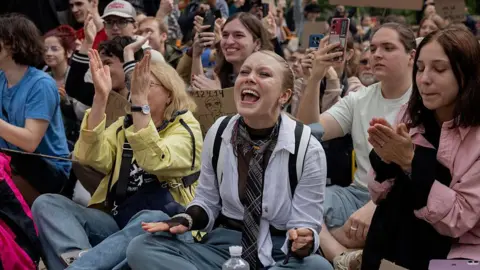In a dynamic political climate, Ukraine’s young citizens recently mobilized in significant numbers, prompting President Volodymyr Zelensky to reverse a contentious law. The shift came to light earlier this Thursday as the Rada, Ukraine’s parliamentary body in Kyiv, witnessed an overwhelming vote to restore the autonomy of essential anti-corruption agencies: the National Anti-Corruption Bureau (NABU) and the Specialized Anti-Corruption Prosecutor’s Office (SAP). This legislative decision marked a pivotal moment, reflecting the growing influence of youthful voices in a nation under continuous threat from external aggression and internal corruption.
The cause for the protest spurred from a law Zelensky had introduced less than two weeks earlier. That legislation would have diminished the power of NABU and SAP by transferring prosecutorial authority over high-level corruption cases to a general prosecutor, a position appointed by the president himself. For the vast majority of young Ukrainians, the integrity and independence of these anti-corruption bodies are not just matters of administrative control; they are essential for Ukraine’s future as a European nation. The country’s candidate status for European Union membership hinges on its ability to demonstrate a credible commitment to tackling corruption.
Thousands of protesters, armed with placards bearing messages of solidarity, gathered outside the parliament, demanding not just accountability from their leaders, but also transparency within the government. This growing discontent reflects a significant discourse around governance in Ukraine, where citizens are increasingly unwilling to accept arrangements that compromise democratic principles. The young protestors voiced their unequivocal stance: the authorities “should keep their hands off” these anti-corruption institutions. The overwhelming turnout served as a catalyst, compelling members of the parliament, including Zelensky himself, to heed their constituents’ concerns.
In the days preceding the tumultuous gathering, there was confusion and apprehension, as the parliament had initially backed Zelensky’s controversial proposal. However, the rapid mobilization of the population sparked a decisive change of heart within the Rada, resulting in a unanimous vote of 331 to zero to abolish the law. This rare instance of political unity indicates a critical awareness among lawmakers of the demands from younger generations, who are increasingly engaging in civil society and demanding their voices be heard.
Reflecting on the episode, Zelensky took to social media to reaffirm his commitment to democracy, stating that Ukraine remains a democratic state. However, this debacle has raised concerns regarding the integrity of his administration, as critics point to the increasingly influential role of his chief advisor, Andriy Yermak. Many question how a non-elected official, who is not confined by constitutional checks and balances, could have such a significant impact on Ukrainian democracy.
Moreover, there are growing anxieties that Zelensky’s recent actions may undermine trust with Western allies and donors, who view the strength and independence of anti-corruption institutions as non-negotiable prerequisites for continued support. The urgency for comprehensive reforms is paramount, especially considering Ukraine’s economic fragility, wherein the National Bank estimates a potential budget deficit of $13 billion projected for the upcoming year.
The situation encapsulates a broader struggle in Ukraine, as many young citizens actively confront the challenges posed by corrupt practices and governance deficiencies, particularly in a time of national crisis. With Russian military aggression posing immediate dangers, maintaining stability through democratic means is critical. Young Ukrainians, some of whom are defending their homeland in the face of military conflict, are keenly aware of the implications this fight against corruption has on their country’s trajectory—one that aims at integrating with Europe and ensuring a prosperous future.
The aftermath of the protests signals that the pressures from civil society, especially among the youth demographic, could very well pivot the direction of political dialogue in Ukraine. With their unwavering spirit and determination, the youth have not only challenged their leadership but potentially reshaped the conversation about Ukraine’s path forward in safeguarding democracy against the tumultuous backdrop of war and corruption.












